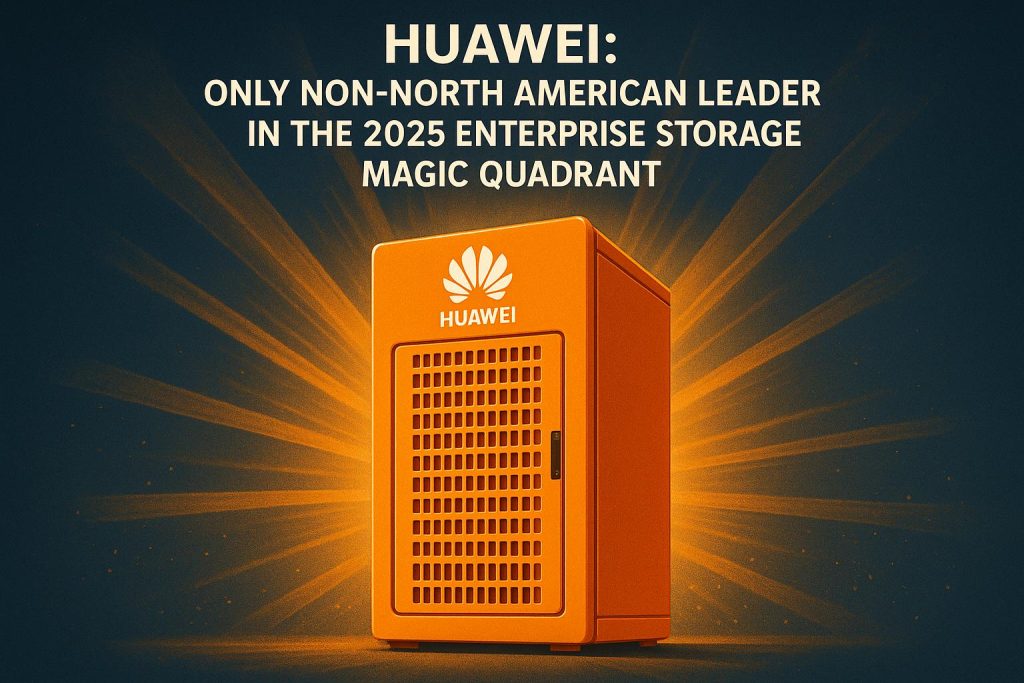Listen to the article
Huawei has been recognised as a Leader in Gartner’s Magic Quadrant for Enterprise Storage Platforms 2025, marking a milestone as the sole non-North American company to achieve this status amid widespread global adoption of its innovative, AI-ready storage solutions.
Huawei has been recognised as a Leader in Gartner’s Magic Quadrant for Enterprise Storage Platforms, 2025, marking a significant achievement as the only non-North American vendor to attain this status. The report, released by the respected analyst firm Gartner, highlights Huawei’s strong presence in the global enterprise storage market, bolstered by its advanced technological innovations. Huawei’s AI-ready data platform, along with its focus on data resilience, efficiency, and intelligent data management, enables it to cater effectively to the complex needs of enterprises operating in hybrid-cloud environments, AI-driven operations, and other critical business scenarios.
Huawei’s data storage solutions enjoy widespread adoption, being utilised in over 150 countries and regions worldwide. The company serves diverse industries including finance, telecommunications, manufacturing, healthcare, government, and public utilities, spanning Latin America, Europe, the Middle East, Africa, and the Asia-Pacific area. This extensive reach underscores Huawei’s commitment to providing robust, scalable storage technologies tailored for a wide range of enterprise requirements.
Huawei’s recognition in Gartner’s Magic Quadrant builds upon its longstanding reputation for excellence in storage technology. Earlier in the same year, Huawei’s OceanStor Dorado All-Flash Storage was named a Customers’ Choice in Gartner’s Peer Insights Voice of the Customer for Primary Storage Platforms, achieving a perfect recommendation score based on over 200 peer reviews. This accolade marks the fourth consecutive year Huawei has been honoured with such distinction, highlighting consistent customer satisfaction and product reliability. Additionally, Huawei’s OceanProtect Data Protection solution received a high willingness-to-recommend rating, reinforcing its strength in backup and recovery software.
The company’s leadership extends beyond storage platforms. Huawei was also named a Leader in Gartner’s Magic Quadrant for CSP 5G RAN Infrastructure Solutions for the fifth consecutive year, notably for its strong ‘Completeness of Vision’ — an indicator of innovation and strategic foresight. This parallel recognition in the telecommunication infrastructure space further cements Huawei’s position as a technology frontrunner.
These accolades follow years of sustained recognition. In 2023, Huawei was named a Leader in Gartner’s Magic Quadrant for Primary Storage for the eighth consecutive year, praised for its reliability, multicloud ecosystem integration, data resilience, and AI-driven operations management. Customers have repeatedly endorsed Huawei’s File and Object Storage Platforms, with the OceanStor Scale-Out Storage earning the highest overall rating and strong recommendation scores for four consecutive years, according to Gartner Peer Insights.
While Gartner explicitly states it does not endorse any vendor or product and advises technology users to base decisions on individual needs rather than ratings alone, Huawei’s repeated appearances in leadership positions and as a customer favourite demonstrate a proven track record. The company’s continuous innovation and ability to meet evolving enterprise demands with scalable, intelligent storage solutions contribute to its growing global footprint.
Huawei’s recognition in both Gartner’s Magic Quadrant and Peer Insights for multiple categories reflects its broad portfolio and the trust it has cultivated among enterprise users globally. As data demands grow increasingly complex and organisations seek more intelligent, resilient storage options, Huawei’s advancements provide a noteworthy example of how global vendors outside North America are shaping the future of enterprise storage technology.
📌 Reference Map:
Source: Fuse Wire Services


